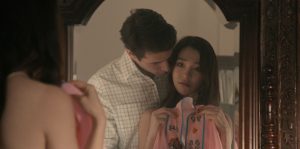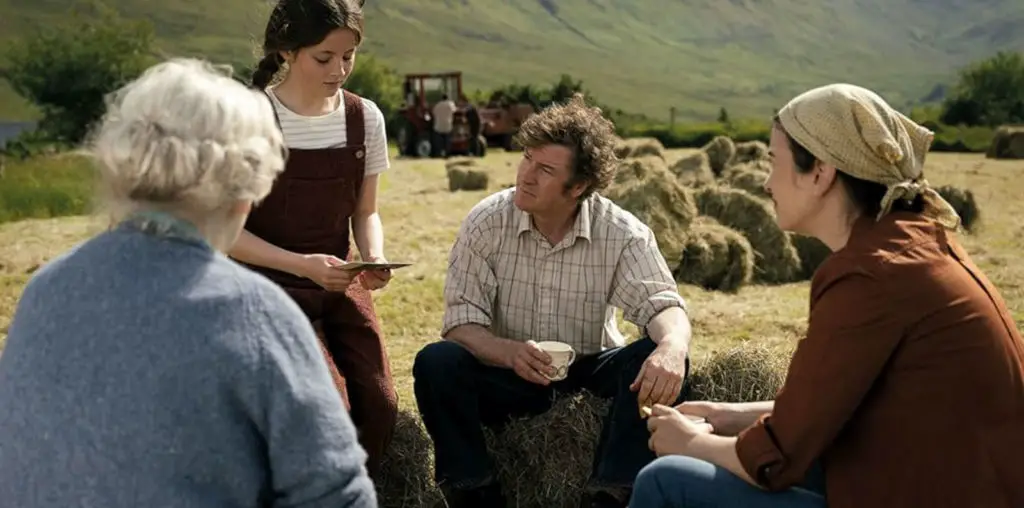
Susu, the assured and alluring feature directorial debut of Yixi Sun, is a reminder of just how far atmosphere, mystery, and style can carry a movie.
The film has its feet planted firmly in the tropes of Gothic melodrama – a mysterious old house, a troubled and delicate young heroine, a disturbing family secret to be unearthed, etc. – but although it’s stubbornly faithful to the cinematic and literary traditions it honors, it plays out its story with a confidence and craft that make it more than worthwhile.
Sun excels in creating a captivatingly melancholic tone, bolstered by the film’s stately, subtly ominous visual style and some spot-on casting. Fresh-faced newcomer Zitong Wu stars as Qi’an, a Chinese art student in London who’s offered a seemingly quick and lucrative weekend gig transcribing old films for a wealthy private collector. The reserved and conscientious Qi’an has an opposites-attract sort of friendship with her more impulsive and energetic classmate/roommate Aimo (Zhu Lin), and she lets Aimo tag along to keep her company on the assignment, which finds the pair largely cut off from the rest of the world in a sprawling, gloomy mansion deep in the English countryside.

“…a mysterious old house, a troubled and delicate young heroine, a disturbing family secret to be unearthed…”
That labyrinthine, antiques-filled house, where much of Susu is set, is presided over by Shirley Stuart (Steve Edwin), the cross-dressing son of a wealthy, long-deceased collector of film memorabilia and equipment. Shirley is the place’s only full-time resident, and she provides the details of Qi’an’s job: she’s to translate from Chinese into English a collection of films made by Shirley’s brother of his late wife Susu, a former Chinese opera star who committed suicide decades earlier in the very house where they’re staying. Though the danger that Qi’an almost immediately feels at the Stuart estate is, at first, mostly rooted in her own anxious mind, the house’s dark past – and the mystery of Susu’s life and death there – soon begin to manifest themselves in increasingly threatening ways.
Susu spins out its secrets, relating to both the Stuart family and to a traumatic incident from Qi’an’s time in London, with a sure-footed deliberateness, and a palpable sense of dread hangs over the entirety of the proceedings. The film’s horrors are of the psychological, rather than supernatural, variety, and while Sun makes only a few attempts at outright scares (a mysterious neighbor banging on the door in the middle of the night, for example, or a tantalizing reaction shot of a character viewing something unsettling in Susu’s room), the isolation of the setting and Shirley’s enigmatic motivations are particularly instrumental in keeping viewers on edge throughout.

“…the film is gorgeous to look at, its twists are pulled off with obvious aplomb, and the screenplay is quite satisfying…”
That feeling of foreboding increases almost exponentially with the arrival of Benjamin (Frederick Szkoda), Shirley’s nephew and Susu’s orphaned son, whose kindness toward Qi’an and Aimo stands in sharp contrast to the intense and authoritative Shirley and, thus, makes him an immediately suspicious figure. Szkoda, who bears more than a passing resemblance to a young Anthony Perkins, delivers the film’s standout performance, and while the refined, soft-spoken Benjamin seems more troubled than dangerous, he obviously knows more about his family’s history than he lets on, and his interest in the girls is a clear signal of something sinister that’s being kept hidden from them.
Susu‘s stew of dark Freudian undercurrents, mysterious disappearances, and peril that gradually evolves from implied to imminent doesn’t stray very far from what one might expect from such a classical dramatic narrative. Still, even if the story’s ultimate revelations aren’t terribly surprising, the film is gorgeous to look at, its twists are pulled off with obvious aplomb, and the screenplay (also by Sun) is quite satisfying in the way it poses some very intriguing questions early on and deftly pays them off later. Sun clearly has a fine handle on the Hitchcockian perversities of her narrative and an eye for arresting images (particularly those involving objects of Chinese culture and vintage cinema), and, overall, Susu seems to signal great things to come – for its creator, if not for the doomed and disturbed characters it revolves around.

Susu (2017) Written and directed by Yixi Sun. Starring Zitong Wu, Zhu Lin, Steve Edwin, Frederick Szkoda, Tom Mannion, Laura Jane Hudson, and Roslyn Hill
7.5 out of 10

